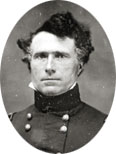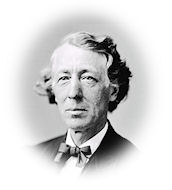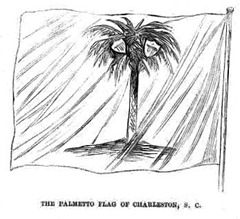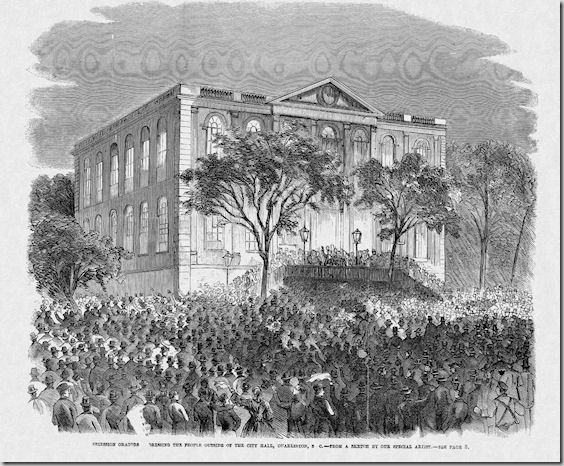.FORT MOULTRIE, S.C., November 23, 1860.
Col. S. COOPER,
Adjutant-General, U. S. Army:
COLONEL: In compliance with verbal instructions from the honorable Secretary of War, I have the honor to report that I have inspected the forts of this harbor. As Major Porter has recently made a report in relation to them, I shall confine my remarks mainly to other matters, of great importance, if the Government intends holding them. At Fort Moultrie the Engineer, Captain Foster, is working very energetically on the outer defenses, which will, should nothing unforseen occur to prevent, be finished and the guns mounted in two weeks. There are several sand hillocks within four hundred yards of our eastern wall, which offer admirable cover to approaching parties, and would be formidable points for sharpshooters. Two of them command our work. These I shall be compelled to level, at least sufficiently to render our position less insecure than it now is. When the outworks are completed, this fort, with its appropriate war garrison, will be capable of making a very handsome defense. It is so small that we shall have little space for storing our provisions, wood, &c. The garrison now in it is so weak as to invite an attack, which is openly and publicly threatened. We are about sixty, and have a line of rampart of 1,500 feet in length to defend. If beleaguered, as every man of the command must be either engaged or held on the alert, they will be exhausted and worn down in a few days and nights of such service as they would then have to undergo.
At Fort Sumter the guns of the lower tier of casemates will be mounted, the Engineer estimates, in about seventeen days. That fort is now ready for the comfortable accommodation of one company, and, indeed, for the temporary reception of its proper garrison.
Captain Foster states that the magazines (4) are done, and in excellent condition; that they now contain 40,000 pounds of cannon powder and a full supply of ammunition for one tier of guns. This work is the key to the entrance of this harbor; its guns command this work, and could soon drive out its occupants. It should be garrisoned at once. Castle Pinckney, a small casemated work, perfectly commanding the city of Charleston, is in excellent condition, with the exception of a few repairs, which will require the expenditure of about $500. They are–1st, replacing three water Casks and the old banquette on the gorge; 2d, repairing one of the cisterns and the old palisading, which, though much rotten, may at a trifling expense be made to answer for the present; 3d, making six shutters for the embrasures and doing some slight work to the main gates. Two mortars and a few other articles belonging to this work were taken to the United States Arsenal in Charleston some months since for repair. They are still there. I shall ask the officer in charge to return them as soon as he can. The magazine is not a very good one; it contains some rifle and musket powder, said to be good, and also some cannon powder reported damaged. The powder belongs to the arsenal. It is, in my opinion, essentially important that this castle should be immediately occupied by a garrison, say, of two officers and thirty men. The safety of our little garrison would be rendered more certain, and our fort would be more secure from an attack by such a holding of Castle Pinckney than it would be from quadrupling our force. The Charlestonians would not venture to attack this place when they knew that their city was at the mercy of the commander of Castle Pinckney. So important do I consider the holding of Castle Pinckney by the Government that I recommend, if the troops asked for cannot be sent at once, that I be authorized to place an Engineer detachment, consisting, say, of one officer, two masons, two carpenters, and twenty-six laborers, to make the repairs needed there. They might be sent without any opposition or suspicion, and would in a short time be sufficiently instructed in the use of the guns in the castle to enable their commander to hold the castle against any force that could be sent against it. If my force was not so very small I would not hesitate to send a detachment at once to garrison that work. Fort Sumter and Castle Pinckney must be garrisoned immediately if the Government determines to keep command of this harbor.
I need not say how anxious I am–indeed, determined, so far as honor will permit–to avoid collision with the citizens of South Carolina. Nothing, however, will be better calculated to prevent bloodshed than our being found in such an attitude that it would be madness and folly to attack us. There is not so much of feverish excitement as there was last week, but that there is a settled determination to leave the Union, and to obtain possession of this work, is apparent to all. Castle Pinckney, being so near the city, and having no one in it but an ordnance sergeant, they regard as already in their possession. The clouds are threatening, and the storm may break upon us at any moment. I do, then, most earnestly entreat that a re-enforcement be immediately sent to this garrison, and that at least two companies be sent at the same time to Fort Sumter and Castle Pinckney–half a company, under a judicious commander, sufficing, I think, for the latter work. I feel the full responsibility of making the above suggestions, because I firmly believe that as soon as the people of South Carolina learn that I have demanded re-enforcements, and that they have been ordered, they will occupy Castle Pinckney and attack this fort. It is therefore of vital importance that the troops embarked (say in war steamers) shall be designated for other duty. As we have no men who know anything about preparing ammunition, and our officers will be too much occupied to instruct them, I respectfully request that about half a dozen ordnance men, accustomed to the work of preparing fixed ammunition, be sent here, to be distributed at these forts.
Two of my best officers, Captain Seymour and Lieutenant Talbot, are delicate, and will, I fear, not be able to undergo much fatigue.
With these three works garrisoned as requested, and with a supply of ordnance stores, for which I shall send requisitions in a few days, I shall feel that, by the blessing of God, there may be a hope that no blood will be shed, and that South Carolina will not attempt to take these forts by force, but will resort to diplomacy to secure them. If we neglect, however, to strengthen ourselves, she will, unless these works are surrendered on their first demand, most assuredly immediately attack us. I will thank the Department to give me special instructions, as my position here is rather a politico-military than a military one.
I presume, also, that the President ought to take some action in reference to my being a member of the Military Academy Commission, which is to reconvene in the city of Washington in a few days.
Unless otherwise specially directed, I shall make future communications through the ordinary channels.
I am, colonel, very respectfully, your obedient servant,
ROBERT ANDERSON,
Major, First Artillery, Commanding.










